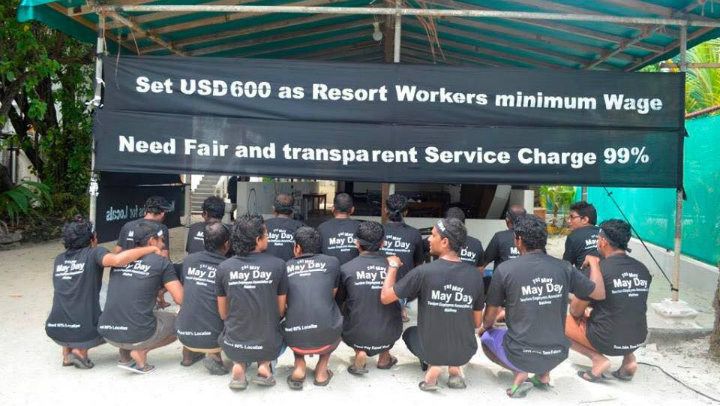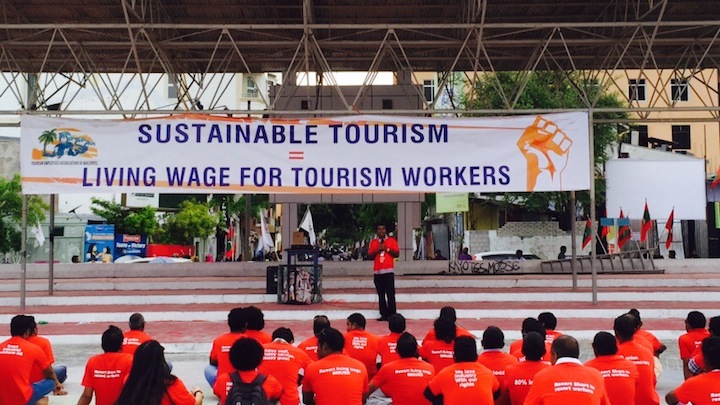Maldivian businesses should not feel threatened by a shift towards a liberalised economy despite the significant changes to tax and regulation, the chair of an economic forum between industry and cabinet heads held this week in Male’ has said.
Mohamed Ali Janah, President of the Maldives Association of Construction Industry (MACI) and a business owner himself, claimed that government-proposed economic reforms were no different changes that had already occurred across the western world and parts of South Asia.
While welcoming liberalisation in general, the MACI president said he believed that industry would still likely require more time to adapt to the transitions such as a minimum wage and greater taxation on goods and services.
“We are in something of a transition period right now, but what we want businessmen to understand is that they should not feel threatened [by these changes],” he said. “We are being pushed towards a more liberal economic system where we will need more accountability and transparency.”
Janah claimed the proposed changes reflected a potential move away from the style of family-dominated business dealings that he suggested may in some cases have been less likely to aim for transparency and detailed accounting.
“These things will be exposed, so there may be some reluctance,” he said.
Janah’s comments were made following the second in an ongoing series of meetings held between various local associations like the Maldives Association of Tourism Industries (MATI), the Maldives Association of Travel Agents and Tour Operators (MATATO) and the Liveaboard Association of Maldives (LAM) and various cabinet ministers.
This week’s forum, which was chaired by the MACI president, was the second of its kind to be held between business and cabinet members this year over government economic reform strategies. Finance Minister Ahmed Inaz, Tourism Minister Dr Mariyam Zulfa and the Governor of the Maldives Monetary Authority (MMA) Fazeel Najeeb were all in attendance, with organisers claiming that workers’ associations and media representatives were also invited.
Business roundtable
While the initial meeting was focused prominently on issues like government aims to introduce a minimum wage, Janah said that in chairing this week’s meeting, he had called for the formation of a business roundtable that would represent industry and commerce across the country in directly lobbying the government over potential concerns.
The MACI president said that while this week’s business meetings still had political components during their discussions, he hoped to give attendees a forum to discuss various industry issues more directly, beyond the partisan thinking often linked to decision making in the country.
“We have more than enough political forums, but not enough is being done to allow businesses to talk on a purely technical level,” he said. “I propose that we start a business roundtable. Let’s get all the industries on board and look at various issues including climate change.”
With so many changes expected to be made to business practice in the Maldives, Janah said that he hoped a round-table would be better able to lobby for “sustainable” implementation of reforms in areas such as pay and taxes.
In the context of the government’s reform agenda, other association heads present at the forum suggested that a gradual implementation of a general Goods and Services Tax (GST) and a minimum wage over a number of years were needed by the industry as an example of “sustainable developments”, particularly for small and medium industries.
The collaborations between government and industry targeted through the forums were welcomed by State Minister of Finance Ahmed Assad, who told Minivan News that the meetings were focused on trying to outline a development path for business to the benefit of the entire country as well as the economy.
“As the economy grows, so also should government finances so that the state can meet the demands of the public. Our main aim is for business to thrive to support government finance at sustainable levels,” he said.
Assad claimed that at present, the government’s sole revenue stream from business outside of the country’s tourist industry – recently estimated to amount potentially to around US$3 billion – was in the form of customs duty.
However, with the proposed introduction of additional taxes like GST on local businesses, the state finance minister added that this would create growing interest in the conduct of how government was spending income.
“Once we have a state run on contributions from business, I am sure there will be a lot more interest where this funding goes,” he said.
Robin Hoods and Bolsheviks
Addressing the notion of the term “sustainable” in regards to industry developments, Assad rejected accusations that a combined lobbying group would grant further power to business heads at the expense of individual workers and their rights.
From his own perspective, the state minister said he believed local businesses were generally wary of creating “Robin Hoods and Bolsheviks” by discriminating and alienating their work forces and appreciated that negative worker relations were not in their interest.
“Smart people will always take care of their own workers,” he said. “Maldivian business people are intelligent and wish to keep a good balance in the workplace.”
A stable and confident workforce was also highlighted by Assad as being hugely important in attracting interest from foreign investment to the Maldives.
The tourism side
Among industry groups present at this week’s economic minister was the Maldives Association of Travel Agents and Tour Operators (MATATO), which raised concerns in particular over government commitments to the South Asian Association for Regional Cooperation (SAARC) potentially removing restrictions on foreign businesses.
Mohamed Maleeh Jamal, Secretary General for MATATO, said the group held some concerns about SAARC initiatives to open up the Maldives tourism markets and allowing foreign travel agents to operate in the country.
While claiming to not be against market liberalisation, Maleeh said that local travel agents were facing increased competition from booking engines and unregistered travel agencies operating illegally in the country.
Amidst growing competitiveness, the MATATO secretary general said that other member nations like Sri Lanka had recently dropped providing free visas on arrival to the country for any nation other than Singapore or the Maldives that was claimed to contravene SAARC rulings on freedom of movement.
In addressing matters specific to the Maldives, Maleeh claimed that MATATO had agreed during the previous forum held two weeks ago that it would support the introduction of the minimum wage, although the group said it had required government action on reducing illegal labour in the country.
“We need more research on the impacts of this and why local people are not seeking out available work,” he said.
Maleeh claimed that even without the possible formation of a formal business round-table to debate industry-wide policy, the association welcomed continued collaboration between various business heads and government.
However, one workers group in the country linked to tourism has pressed the government on implementing more immediate policy changes in relation to employment regulation.
Just last month, the Tourism Employees Association of the Maldives (TEAM) actively urged the government to implement a minimum wage needed to address what it sees as a growing gap between the rich and poor.
“TEAM believes that the most important thing to do in order to change the current situation of all persons working in the tourism industry is to implement a minimum wage,’’ said the organisation at the time.
“A minimum wage is also important to avoid the potential bankruptcy of small and medium businesses and to eliminate the differentiation between the rich and poor.’’
TEAM urged the government to conduct a fair survey and to determine an adequate minimum wages, “instead of only listening to few influential big businessmen.’’
The association claimed the minimum wage for those working in the tourism sector should be at least Rf 5000 (US$325) per month.
Likes (0)Dislikes
(0)Dislikes (0)
(0) 
